*Thank you Malaysiakini for carrying this Statement of 32 groups. Media play an important role, especially in a democracy - They can help disseminate views and opinions so that it will be heard by all...It is essential for the freedom of expression, freedom of opinion and human rights. A media organisation may not have the time to report on every statement/opinion - but then, they can always publish it in their Opinion columns. There is always a risk for the Media Organisation - because sometime the alleged oppressor can react and maybe even sue the Media organisation or even 'suspend/terminate' the said publication. Like all in Malaysia, media too will have to make the choice - to play safe, or bravely act in the interest of justice, human rights ...including freedom of expression and/or opinion(even when it is an opinion that the Media itself may not agree with.). Print media have restrictions as to space but online media has much more space. If media chose not to publish views of the poor, marginalised, civil society groups, human rights defenders, trade unions ...the people will stop expressing themselves...and that is a great loss.
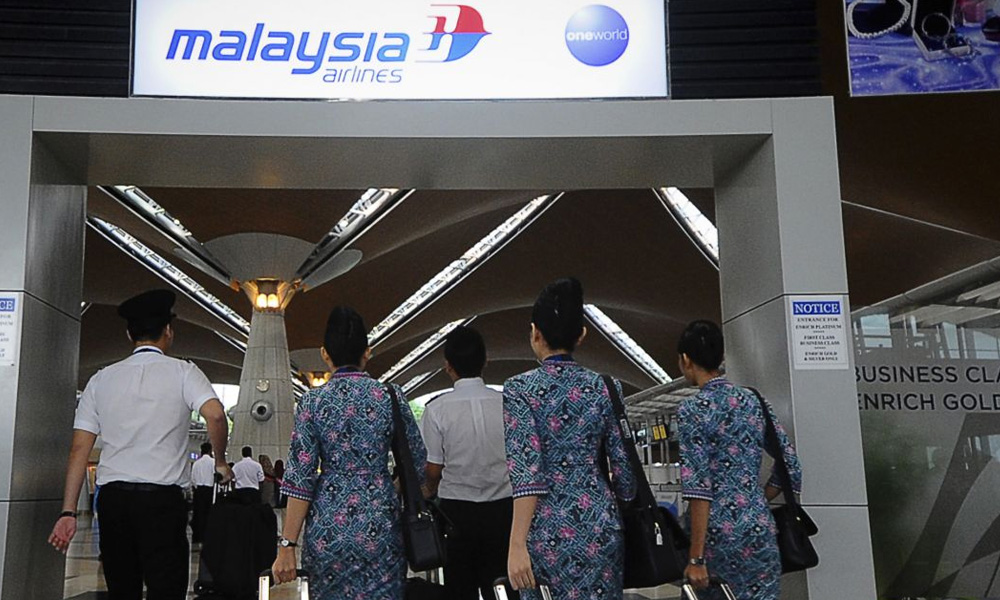
Workers rights should not be hindered by the gov't
COMMENT |
We, the 32 undersigned organisations, trade unions and groups are
shocked that the Human Resources Minister Richard Riot had decided not
to refer the claim of about 3,600 Malaysian Airlines (MAS) workers,
claiming wrongful dismissal and reinstatement, to the industrial court –
hence denying these workers the right for their claim to be heard
speedily and determined. This is grossly unjust.
It must be noted that past statistics revealed in
parliament has shown that between 2001 and 2011, 31.5 percent or about
10,016 of about 31,714 workers who claimed wrongful dismissal and
reinstatement were denied access to the industrial court by the minister
who decided not to refer their cases to the court.
Whether a worker’s claim for reinstatement is successful is
a matter that should be decided by the courts, after careful
consideration of all facts, evidence and submissions on law - not by a
minister,who has not accorded the right to be heard to the affected
worker and employer, and possibly only relying on limited notes of an
officer handling the attempt at conciliation at the Industrial Relations
Department (IRD).
It must be noted that at the IRD conciliation stage, the
worker is also not allowed to be represented by a lawyer of his choice,
and hence, a worker would have to represent themselves or be represented
by a union representative. As such, there is also a likelihood that all
relevant facts and legal arguments may not have been put forward, thus,
a decision of a minister in such circumstances can lead to a
miscarriage of justice.

Most times, the representations are only oral, and without
written representations enclosed with relevant documents and legal
arguments. The right for a worker to be represented by a lawyer or a
qualified legal representative at all stages of the administration of
justice is, therefore, essential.
The suffering worker
When a worker loses employment and income, it is essential that justice is done speedily, preferably within a few months.
A worker who just lost their employment suffers a loss
of income and it impacts on one’s financial security and that of their
family, who would have to deal with all continuing monthly financial
obligations of the family.
A failure to pay in time could result in loss of home,
personal vehicle, deprivation of basic amenities and even a rising debt
given the fact that most Malaysians have low savings.
The worker will also likely not be able to secure loans
from financial institutions because of the loss of their employment and
may be forced to resort to borrowing from illegal money lenders, who
charge a very high interest rate. Unless justice is achieved quickly,
there is a real risk of the worker and their families plunging deeper
into poverty.
On the other hand, the employer most likely will continue their business as usual.
The pursuit of justice also requires monies, and it
is likely that many workers, especially from the lower and middle-income
category, will simply choose to walk away. Victims are not able to
undertake the quest for justice, and the employer perpetrators of
injustice get off scot-free.
Whilst the Malaysian government has provided legal aid to
the poor in criminal matters, the government does not provide legal aid
to workers, especially the poor. However, the Malaysian Bar has now made
available legal aid lawyers to qualified workers.
Most importantly, the rights of a worker to be represented
by lawyers of their choice at all stages of the administration of labour
justice are currently barred by law, and this right must be provided to
ensure equity and justice to workers in their quest for justice against
employers and even the government.
Worker discrimination
Victims of injustice can generally immediately commence
court actions against the alleged perpetrators, but not workers claiming
wrongful dismissal and their employment back.
These workers are discriminated against as they have no
right to immediately pursue their claims of wrongful dismissal and
reinstatement at the industrial court. They will have to go through many
administrative steps before their wrongful dismissal cases ever reach
the court. For these victims, they can only get their cases heard by the
industrial court only if the minister refers their cases.
It is very wrong and unjust for the minister to be able to
prevent workers from immediately bringing their claims to the industrial
court. The fact that the government also owns and controls many
employer companies makes it even more unjust for a member of the
executive, a cabinet minister, to have such power. Malaysian Airlines,
for example, was a wholly owned government company.
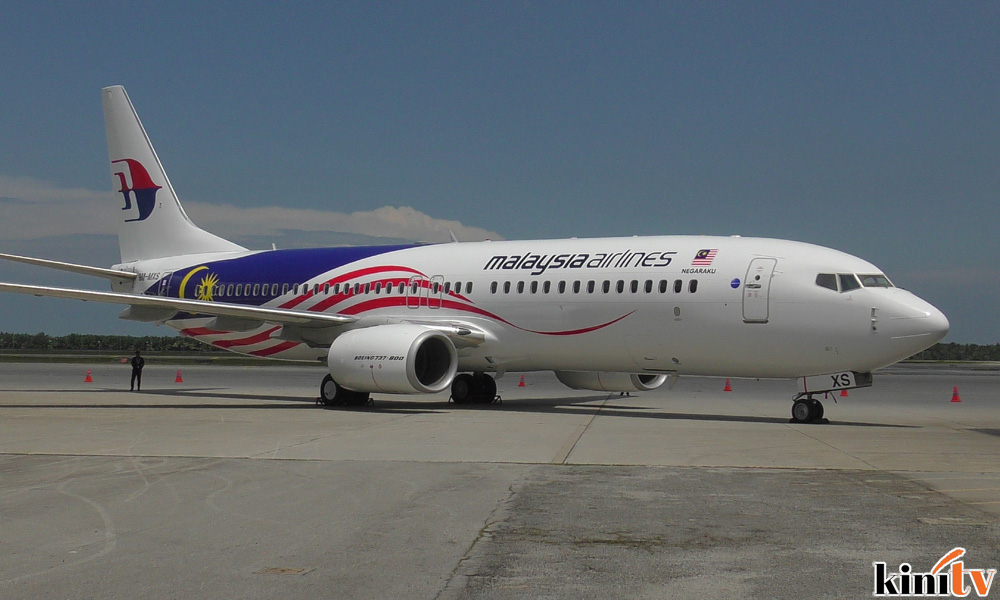
The hurdles that have to be overcome by workers in their
quest to reach the industrial court to claim wrongful dismissal and
reinstatement in Malaysia is provided for in the existing unjust laws.
This includes the need to first lodge a claim/complaint
within a stipulated time at the IIRD, then go through the conciliation
session at the IRD, and thereafter, if no conciliation, the claim is
referred to the minister who then decides whether the case is referred
to the industrial court or not.
Their quest for reinstatement to their job may not even end
in court, and may be ended prematurely in this administrative process
including the decision of a minister not to refer the case to court.
The conciliation session
The ‘conciliation’ session is an attempt for the affected
worker and employer to come to some sort of settlement, and therefore
there will be no need to send the matter to the minister, and possibly
the industrial court.
Rather than investigating and enforcing the law, the IRD
sadly plays the role of an ‘impartial’ go-between, not taking sides, to
get the parties to come to some sort agreement so that the worker does
not proceed any further with their claim to reinstate their employment.
It is most unlikely that the conciliation session will not
end with any employer agreeing to reinstate the worker to their previous
employment, or even paying out just compensation in lieu of
reinstatement.
Some employers may try to settle the claim by making a nominal payment, and so, real justice ends undone.
Now, conciliation or mediation could happen at the
industrial court, where currently it is not uncommon for the court to
try to get parties to settle and come to an agreement through mediation
before the trial commences.
Attempts of settlement can also happen at any time, as initiated by any party, via their
lawyers, trade unions, legal representatives or even third parties. As
such, there is really no need for these time-consuming conciliation
sessions at the IRD at all.
The minister's reference
Now, if and when this conciliation attempt fails, then the
matter is referred to the minister who again seems to take too much
time, and in the case of these MAS ex-workers, it took two years before
it was decided by the minister that he would not refer the case to the
industrial court.
Note, the minister decides whether to refer or not to refer
to the industrial court without even according the right to be heard to
the affected worker and/or the employer. It is a decision which is not
even based on all the facts and evidence, and as such could be said to
be arbitrary.
All that the minister has are the notes taken by the IRD
officer who had conducted the conciliation session. Being a conciliation
session, parties may even not be providing all the relevant facts and
evidence, especially the evidence of other witnesses.
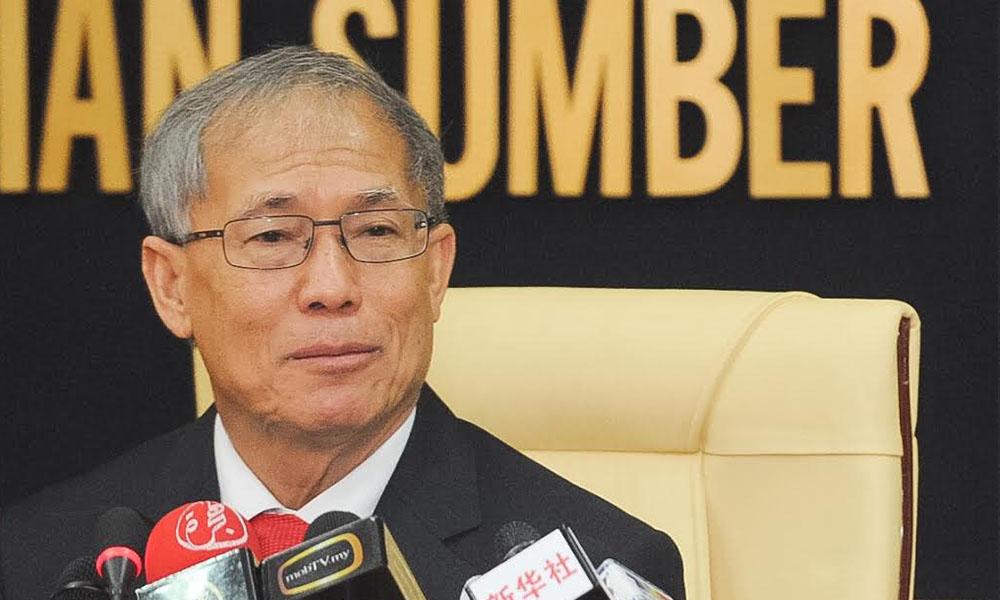
It is, therefore, most shocking that about 31 percent of worker claims are not referred to the industrial court by the minister.
The reasons for the non-referral by the minister that were
given in Parliament included reasons of misconduct, voluntarily stopping
their employment and/or accepting the Voluntary Separation Scheme (VSS)
and changing their mind, or that their employment contract period had
ended.
These reasons given by the minister are usually what
employers will say to justify termination. However, these are matters to
be decided by the courts after hearing and considering all evidence and
facts.
Was the employer right in terminating the worker, or was
the worker right in saying that it was a wrongful dismissal? Was the
alleged misconduct even a valid misconduct agreed before by both parties
of an employment contract? Was the worker deceived by the employer and
their agents? These are matters that only a court should be deciding on
after not just hearing evidence of the parties to the dispute, but also
other relevant witnesses.
A worker who takes the trouble, expending monies and time,
to file a claim for wrongful dismissal asking for reinstatement most
likely has a case and arguments to justify such a claim, and there is a
need to consider all the facts and listen to all the evidence, including
evidence from witnesses, to determine the truth and make a final
decision.
This is the task of the courts, not the minister.
Delays in the industrial court
There are currently no time limits set for the completion
of an industrial court case or appeals thereafter. It can take years
from the date the case is referred to the industrial court until the
completion of the trial.
The hearing and conclusion of the trial at the industrial
court can take years, and in some cases, may even take five years or
more after the date of wrongful dismissal. If the worker is victorious,
then the fruits of justice can further be delayed by appeals to the
higher courts.
The long drawn out process before the case reaches the
court and the time taken for trials to complete would most likely deter
most workers from filing a claim or even cause them to abandon the claim
midstream.
Thus, the procedures made may ultimately end up protecting violators of laws and rights rather than the workers themselves.
Reducing a worker's entitlement
The injustice to the worker was compounded by the fact that
from Feb 2008, the law limited the amount of claim for a worker who was
successful in court proving that he was indeed wrongfully dismissed.
The maximum amount they can get is 24 months in back wages,
even if it takes five years or 10 years before he gets his employment
back or the final judgment that he was wrongfully dismissed.
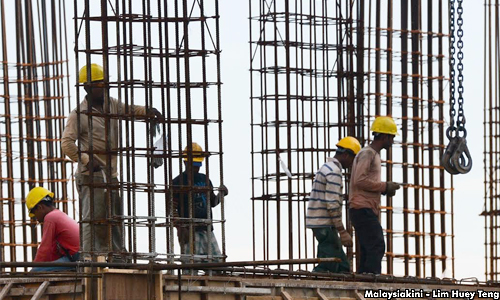
Before this amendment, a worker successful in his claim
would have been entitled to not just back wages from the date of
wrongful dismissal until the date of reinstatement or the date of final
judgment. They would also be entitled to whatever increments and bonuses
that he would have gotten if not for the wrongful dismissal by the
employer.
The new Second Schedule of the Industrial Relations Act
1967, in Paragraph 1 now states, “In the event that back wages are to be
given, such back wages shall not exceed twenty-four months' back wages
from the date of dismissal based on the last-drawn salary of the person
who has been dismissed without just cause or excuse”.
Moreover, there are provisions for even further deductions
from the amount of back wages due and payable if the worker was earning
whilst he was waiting to get back his job.
Now even if the worker is victorious, a further sum shall
be deducted for “contributory misconduct of the workman,” and this
amounts to penalising the worker despite their success in court.
The courts should not only decide whether the worker was
wrongfully dismissed or not, but also what the worker receives from
their employer all that he would have earned, including wage increments
and bonuses, from the date of his wrongful judgment until the date of
reinstatement and/or final judgment.
There should also be a need for further damages that ought
to be paid by the employer for the violation of the worker’s rights and
the law, and also for the suffering caused.
The government's duty
Enforcement of the law and protecting worker rights should
be a priority of the government. The government, in particular, the
Human Resource Ministry and its various departments, should be regularly
inspecting, investigating and ensuring that rights are not violated and
laws are enforced. On the receipt of information of alleged violations
from any source, the ministry should speedily investigate and ensure
that the law is complied with at a particular workplace.
The practice of waiting for the victims to lodge formal
complaints or claims before action is taken must end, as most victimised
workers are worried about lodging formal complaints against their
employer, more so when they are still in employment for fear of
retaliation, which may also include dismissal.
The law empowers the Human Resources Ministry to conduct
regular inspections, but a perusal of the statistics provided by the
ministry shows that there are only inspections, investigations and
prosecutions carried out by the Occupational Safety and Health (OSH)
department, and there are no statistics about inspections,
investigations, prosecution and/or enforcement of the basic worker and
trade union rights like payment of wages, overtime, wrongful dismissal,
discrimination and such rights.
A perusal of the Human Resources Ministry quarterly reports, Statistic Pekerjaan dan Perburuhan Siri 13 Bil 3/2017 September
(Employment and Labour Statistics) discloses no statistics of workplace
inspections to ensure that worker and trade union rights are not being
violated, no statistics of investigation and prosecution of employers
that have violated labour laws and fundamental worker rights, no
statistics of information or complaints received and no statistics of
employers found guilty. The only available are matters concerning the
OSH.
Given the fact that there are statistics on OSH inspections
and enforcement, it looks like the Malaysian government and the Human
Resources Ministry are not interested in protecting basic worker and
trade union rights. After all, the statistics of inspection,
investigation, prosecution, conviction and enforcement against employers
who breach existing Malaysian labour and trade union laws are
information so easily compiled by the government.
The case of Malaysian Airlines
These 3,200 workers were employees of the Malaysian
Airlines, a wholly government-owned company. The airline had decided to
reduce the workforce by 6,000 workers, a process normally done via a
retrenchment exercise, which would have had to comply with existing just
legal principles like Last In First Out (LIFO).
However, what the Malaysian government did was to form a
new company, and terminate all employees in the previous company – and
then re-employed selected workers in the new wholly owned company. This
would not be just and is a violation of worker rights.
The Malaysian government then passed a new law that made
the new company specifically not liable for the actions and liabilities
of the old company.
This exercise may also be the biggest union-busting
exercise of recent times, as six of the trade unions were in-house trade
unions, and this exercise would have effectively killed all those
unions.
However, the airline employees in Malaysia did previously
have a national union. In February 1979, 22 members of the Airlines
Employers Union (AEU) were detained under the ISA after a pay dispute at
the state-run Malaysian Airline System (MAS) had led to a work to rule
and a government order to deregister the union.
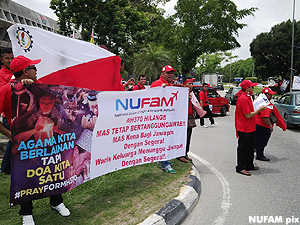
Thereafter, only in-house unions existed for employees of
MAS, until the recent registration of National Union of Flight
Attendance Malaysia's (NUFAM). However, despite Nufam's success in
getting 62.73 percent of the votes at the secret ballot, and the
director general of industrial relations (DGIR) issuing the formal
letter acknowledging Nufam as a recognised union in MAS, the company
challenged the decision in court.
Considering the background, this nonreference claim of
these 3,200 ex-MAS workers to the industrial court by the minister is
all the more unconscionable. If not for that new law that attempts to
not make the new company that is owned by the same owners of the old
company, the owners and the new MAS company would most likely be found
to be liable for the actions of old MAS company. Even with the new law,
the courts may have found judgement in favour of the former workers.
The minister’s decision of not referring the case to the courts in this case may be tainted with mala fide
– an attempt to even prevent the claims of these former workers from
being considered and determined by the court, where judges are duty
bound to uphold the cause of justice without fear or favour – and not
follow the agenda and intention of the existing Umno-BN government.
The reality in Malaysia where worker rights are not
protected and promoted and instead eroding is embarrassing. When
Malaysia recently wanted to be part of the Trans-Pacific Partnership
Agreement (TPP), one of the preconditions was that Malaysia amends its
labour and trade union laws to enable it to be in compliant with
international labour standards.
While there have been moves on the part of the government to do so, to date, we have yet to see any proposed amendments.
Therefore, we;
-
call on the Malaysian government to ensure that workers claiming wrongful dismissal seeking reinstatement shall have the right to immediately file their claim at the industrial court and that all administrative hurdles including the minister’s discretion to refer a case be removed;
-
call for the revocation of the minister’s decision not to refer this case of the 3,200 former MAS workers, and that their case is immediately commenced and heard by the industrial court. Likewise, all ministerial decisions not to refer worker cases be revoked, and be forthwith heard by the industrial court;
-
call for the repeal of Schedule 2 of the Industrial Relations Act that seeks to, amongst others, limit the worker’s who have been wrongfully dismissed to just 2 years back wages;
-
call for the government to expedite administration of justice, including trials, of workers wrongfully dismissed who are claiming reinstatement to end not later than 6 months from the date of claim;
-
call for the Malaysian government to proactively protect worker and trade union rights, amongst others, by regular inspections, speedy investigations and enforcement of labour laws and worker rights.
-
call on Malaysia to expedite the transformation of existing labour and trade union laws to be in compliance with international human rights and labour standards;
-
call on Malaysia to promote and protect worker and trade union rights.
Charles Hector is writing on behalf of;
ALIRAN
Association of Maybank Executives
ATRAHDOM Guatemala
CAW(Committee for Asian Women)
Christian Development Alternative (CDA), Bangladesh
Club Employees Union Peninsular Malaysia (CEUPM)
Community Development Foundation (CDF)
Electronic Industry Employees Union (EIEU) Southern Region, Peninsular Malaysia
Japan Innocence and Death Penalty Information Center
Garments Workers Federation (NGWF ), Bangladesh
HAK Association from Timor-Leste
Kesatuan Pekerja-pekerja Perusahaan Otomobil Nasional Sdn Bhd
MADPET(Malaysians Against Death Penalty and Torture)
Majlis Rangkaian Kesatuan Sekerja Antarabangsa Malaysia (UNI-MLC)(UNI - Malaysia Labour Centre - (UNI-MLC)
Malaysian Physicians for Social Responsibility
National Union of Flight Attendants Malaysia (NUFAM)
National Union of Transport Equipment & Allied Industries Workers (NUTEAIW)
North South Initiative
Parti Rakyat Malaysia(PRM)
People & Planet, UK
Persatuan Kakitangan Akademik University Malaya - PKAUM (Academic Staff Union)
Persatuan Komuniti Prihatin Selangor dan Kuala Lumpur
Rescue Alternatives Liberia (RAL)
Sahabat Rakyat (人民之友)
Saya Anak Bangsa Malaysia (SABM)
Singapore Anti Death Penalty Committee
Solidarity of Cavite Workers, Philippines
Teoh Beng Hock Trust for Democracy
WH4C (Workers Hub For Change)
Women's Rights and Democracy Centre (WORD Centre)
Workers Assistance Center, Inc. , Philippines
Yayasan LINTAS NUSA, Batam, Indonesia
Read more at https://www.malaysiakini.com/news/406043#D3VKUbxFSRUslJSy.99



